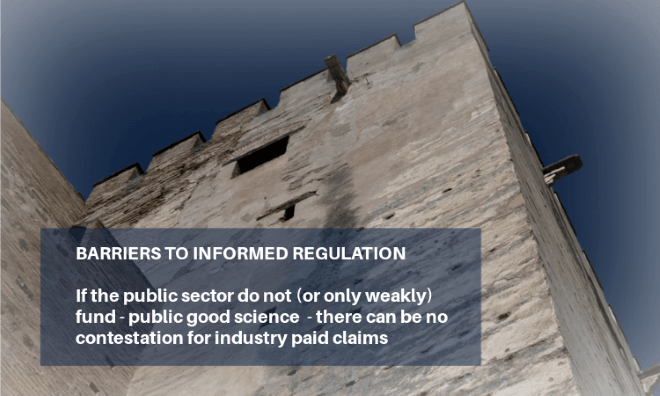Pesticides. It’s Simple. The Corporation Selling The Product Should Not Select The Safety Studies.

In the world of pesticides, regulatory agency policies preferentialise unpublished industry data over published scientific data. This is enabled through the production of policies which favours the decisions made by unaccountable institutions, the WHO-FAO JMPR and OECD – who create guidelines and protocols, some good, but which ultimately exclude important data relating to the toxicity of the full formulation, and the real time, cumulative and intergenerational exposures that the global population are exposed to.
The problem is, substantial and ongoing underfunding of state public good science ultimately leads to situations where public servants are dependent on industry knowledge, because state’s simply don’t fund this kind of research.
This is how science becomes skewed in favour of big business.
Pesticide corporations are intimately involved with the assessment process and as the registrant or sponsor, are given the responsibility by the regulatory agencies to supply the critical studies these assessment agencies use to establish the safe levels for human exposure. On numerous occasions they have been found to have withheld the truth about the harmful effects of their products. Scientists have recommended solutions (e.g. here and here), but without pressure, particularly from public sector actors, regulators are often unable or unwilling to respond in a timely manner.
These agencies only ever use private corporate studies for the critical research that establishes the acceptable daily intake levels (ADI). They hold onto ancient, unpublished studies to maintain high ADI/RfD (permitted levels in daily diets for a lifetime – 60 years). In the last decade pesticide residues on staple food groups have been permitted to increase, massively. Multiple applications of different products on the one plant has increased massively. When new assessments are conducted, these agencies still manage to only consider science solely selected and supplied by the agrichemical industry – a profound conflict of interest.
A corporations’ primary obligation is to their stakeholders, their shareholders. They carry a legal obligation to shareholders to maximise profits. This is naturally, their priority. Pesticide corporations work intimately with the agencies to provide the specific studies that establish the ADI. The ADI level directly impacts product sales.
Underfunding of public good science perpetuates regulatory impotence
Regulatory agencies are created from legislation that places the highest priority on protecting the public. While our legislation looks good and protective at first glance, it is impotent – because lower order guidelines and regulations are out of date, fail to consider formulation toxicity – they subvert the good intention of the legislation.
A higher purpose (founding legislation) should never be subverted by a lower purpose (regulations and policies acting under that legislation). Consider, for example, twenty first century best scientific knowledge (ie. that formulations can cause chronic harm at a biologically – endocrine – relevant level, and responses may be worse at extremely parts per billion, low levels) yet this knowledge has not been adopted in risk assessment (only the active ingredient is tested at milligrams per kilogram and studies are frequently dismissed if there is not a direct dose response pattern) – which relies on 18th and 19th century understanding, and these outdated requirements are embedded in regulatory rules.
Exclusion of public good science
Respected public domain scientists have been producing published research for years, that demonstrates how unsafe current pesticide exposure levels are. Yet this independently produced science doesn’t appear to be included in the major assessments that are held every 12-15 years. This research usually isn’t added to government pesticide information systems in the interim period, either.
Underfunded regulators default to decisions which favour the pesticide industry.
Agencies using suboardinate legislation to create rules (regulation and policy e.g. Klimisch) which are inconsistent with the obligations the risk assessment agency is established under, in legislation, referred to as the ‘purpose’. When authorities ignore their (fiduciary) obligations, public trust can decline, and they risk becoming irrelevant, or worse, acting illegally.
Farmers and pesticide applicators trust that government regulators, such as the EPA or EFSA, will consider all science to ensure the product they use on a regular basis is safe. But regulators only consider science supplied by the pesticides organisations (frequently known as the applicant). Regulators ignore recently published science that establish that exposures are unsafe, and frequently use 10-20 year old seller sponsored (corporate paid) studies to establish the AOEL – accepted operator exposure level. Regulators ignore endocrine studies, long term sub-lethal effects, the impact on the gut that can be tied to depression or gastrointestinal disease. Regulators ignore full formulation studies.
Every farmer and applicator knows the full formulation is stronger and more effective. Risk assessment is completely inadequate for those who use pesticides frequently. It’s not just the public, farmers trust risk assessment agencies to use the most up to date science to assess the chemicals used weekly.
The current evaluations systems are broken.
- Independent, public domain science demonstrating harm is rarely consulted and often dismissed.
- Residue levels on food and in drinking water accumulate in the body, the environment and water. The amount we eat directly relates to amount of pesticides farmers can spray per hectare.
- Pesticide corporations are in control of the quality of studies that directly affects their sale levels.
- Conflicts of interest are rife within this assessment process – within all the agencies.
- The US EPA, WHO and European Union, are ultimately failing in their stewardship and public trust is declining.